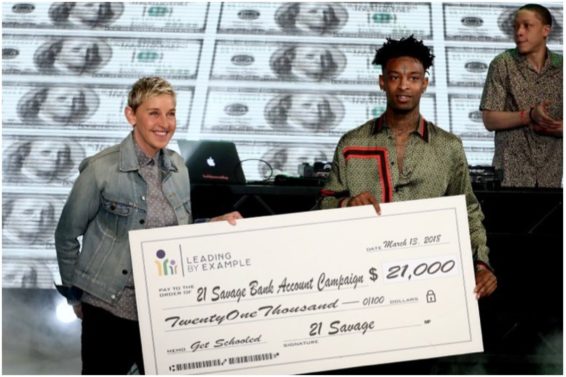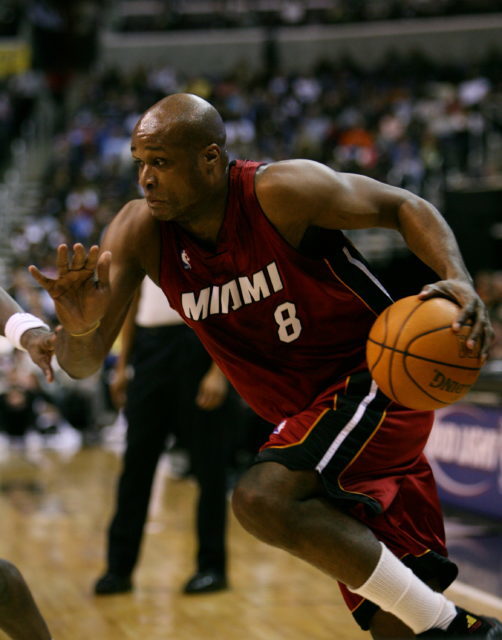A New Stock Market Game that Rewards Patience and Diversification
November 6, 2018
March 21, 2018

Financial literacy is an increasingly popular cause among young celebrities. That doesn’t mean it gets the attention it deserves. But the arrow is pointing the right direction.
Last week, the Atlanta hip-hop artist 21 Savage performed his hit tune Bank Account on the Ellen DeGeneres Show. He then presented a check for $21,000 to the 21 Savage Bank Account Campaign, which will open bank accounts worth $1,000 each for 21 disadvantaged kids. Apply here.
The campaign is in partnership with Get Schooled, a nonprofit that promotes financial literacy among teens prepping for college. Opening a bank account at a young age is a good first step. This simple act may be the quickest route to financial inclusion. It also offers a springboard to financial literacy for underserved kids.
In a statement, 21 Savage said he “knew almost nothing about bank accounts” when he was young and added, “now that I do have money in my bank account, I want to help kids with a background similar to mine to get smart about their money.”
Let’s be clear: $21,000 isn’t a lot of money for a successful rapper whose lyrics boast of having “eight Ms in my bank account” and having spent “seventy-five hunnid on a St. Laurent jacket.” This campaign is generating a fair amount of publicity for his music. Witness the appearance on Ellen, which 21 Savage evidently wanted bad enough to soften the X-rated lyrics.
For fun, check out the original lyrics here. You won’t find any mention of “ready to gun you down” in the version he sang on Ellen, a clean version you can watch below that also subbed in “girls” for a less gracious term, among other concessions to mainstream TV.
So, the 21 Savage campaign feels a little less genuine than the financial literacy effort from New Orleans rapper Dee-1, whose rhymes in songs like No Car Note and Sallie Mae Back impart an actual money message—like the joy of owning a fully paid car and being free of student debt. It also feels less genuine than the financial literacy crusade of the rock band Gooding, which plays hard rock at high school assemblies and follows their show with 15 minutes of talk about credit cards and Roth IRAs. The latest rocker to take up this cause is Carter Hulsey, who plays at middle schools and high schools, and then talks about credit scores.
Dee-1 and Gooding have sponsors. They are getting paid too. Dee-1’s sponsor is PwC, which also sponsors this website and has a deep commitment to the financial literacy cause. Still, as Dee-1 told me: “financial literacy is woven into my brand.”
None of this is meant to be critical of the 21 Savage Bank Account Campaign. On his 21st birthday, 21 Savage was hit six times in a shooting…
• • •
…that killed a friend. He had a rough start in life and rhyming turned things around.
“It’s hard being black,” he told Rolling Stone. “I don’t think people really understand how hard it is to be black. Especially when you coming from nothing. In the hood, there’s already a lot of hate just amongst us black people.”
He is rising above, and with his success looking to give something back in an area where personal experience tells him low-income kids need help: basic money know-how. If his efforts further his commercial success, so be it. Givers often receive. De Tocqueville observed that philanthropy was “self-interest, rightly understood.” Count me a fan.
Financial literacy for students is becoming a thing with other young stars too, including Jennifer Lopez and former NFL star Terrell Owens. Every year, another rich athlete blows it all and decides to share their lessons with kids. In January, CNBC announced that Alex Rodriguez would host Back in the Game, a reality TV show spotlighting broke athletes, their lessons, and their road back.

This is fertile ground, indeed. Sports Illustrated reported that 78% of professional football players go bankrupt or are under financial stress within two years of retiring, and that the same is true of 60% of professional basketball players within five years of leaving the game.
Sports examples keep it real for young people. They can relate to these stars, though probably not to the riches that they fritter away. This is one area where hip-hop has a leg up. Rappers often rhyme about how they came from nothing but were able to move up the socioeconomic scale. It’s a success story, not a tragedy.
And rhyming is fun, at least when you avoid the offensive stuff. That is the theory behind Flocabulary, which helps students build financial literacy and other skills through engagement and creativity. “Music is so powerful,” Alex Rappaport, CEO of Flocabulary told U.S. News.
He uses hip-hop music in lessons about credit cards, for one, targeting pre-teens and teens. “Credit’s like a stick of dynamite; it can mess you up if you don’t see it right. Pay it off each month, don’t forget it” goes one verse in a video on the strictly G-rated site now being used in 35,000 schools. Try it out. Pretty soon you’ll be rhyming along—and learning something in the process.
This Rapper Drives a ’98 Honda to Make a Point About Financial Literacy
What We Know About Financial Education from Broke Athletes
The Growing Effort to Keep Athletes out of Bankruptcy Court
Posted in Youth on March, 2018
September 27, 2017
February 28, 2017
October 4, 2017
November 6, 2016